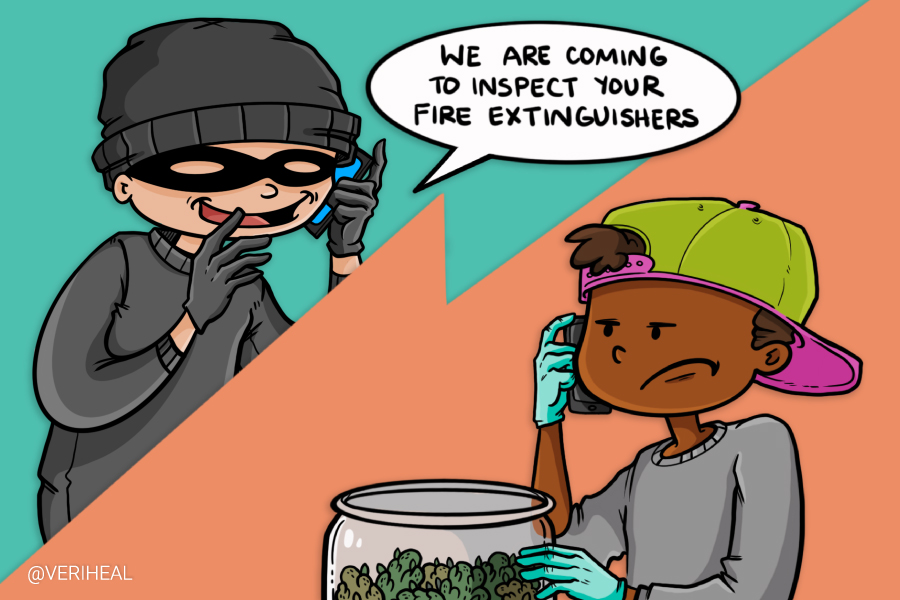The burgeoning cannabis market is one of the most highly regulated and taxed sectors in the United States. The industry is saturated with regulations and restrictions, many of which lead to significant security risks such as having large sums of cash on site of dispensaries due to the lack of banking access within the industry. However, many security risks within the sector could be mitigated with simple training and common sense. Unfortunately, several businesses have recently fallen victim to a scam targeting the legal cannabis sector.
What We Know About the Fire Extinguisher Scam
The scam, which has been deemed “The Fire Extinguisher Scam,” has been reported by several Washington State businesses in recent months. Fire Extinguisher Scams are not isolated to just the cannabis industry. Many of these types of scams have happened before. But here is what we know about this particular scam that’s infiltrating Washington state’s cannabis industry and those that have fallen victim to it thus far.
Initially, the perpetrators will make contact with store employees via VOIP technology. This type of tech allows individuals to place calls over the internet rather than standard phone lines or wireless means. By utilizing this technology, they are able to impersonate the store’s owner or their respective attorneys. Once the perpetrator has convinced the employee that they are their boss or a legal representative of the business, they inform the employee that a government inspector is going to visit the store. The purpose of this visit, to inspect the fire extinguishers.
This is where the perps know they have won the day. Once this convincing is successful, it would then be effortless for scammers to walk right into the business, past security protocols, for a good look at the behind the scenes of things. However, this isn’t the route they have taken to victimize dispensary employees and owners in most cases.
How the Perpetrators Are Gaining From their Scams
Once the scammer has the employee wholly convinced that a government official will be visiting the business, they request for the employee to take pictures of aspects such as fire extinguisher locations, entrances, and emergency fire exits, giving them a good look at the security behind the scenes. In most cases, scammers have gone the extra mile to influence the victims than to meet the supposed owner with large sums of cash, thus resulting in them being robbed. At this time, local law enforcement officers in Washington are involved in investigating all reported incidents of this scam.
An Ongoing Issue Warrants an Alert from Officials
According to an alert issued by the Washington State Liquor and Cannabis Board, also known as the LCB, this scam has been targeting retail cannabis stores in the state for more than a year. The LCB and local enforcement are requesting that anyone who has fallen victim or been targeted by this scam reach out to them immediately.
Why You Should Get Your Medical Marijuana Card
Veriheal has satisfied millions of patients nationwide by giving them access to these benefits
- Larger purchase limits
- Peace of mind
- Enhanced legal protection
- Access to higher potency strains
- Save up to 25% on cannabis purchases
- Skip the line at the dispensary
What Can be Done to Mitigate the Risk of Falling Victim
When it comes to what businesses and their respective employees can do to mitigate the risk of falling victim to a scam such as this, there are many things they can do better protect themselves and their business. One of the most significant moves that businesses can make is to train themselves and their staff to recognize potential scams such as this through proper employee training. The cannabis sector is much different than any other legal industry. The lack of banking access leads many dispensary and business owners to operate with only cash transactions, thus creating a security risk due to large sums of cash being stored on site. Hopefully, next month, with any luck, we will see a change in this lack of access with a vote on the pending M.O.R.E. Act.
Advice from the Experts
Diane Nickerson, the founder of ALN CannaBiz Services & Security Specialties, LLC, has more than 10 years of experience in the security field, with 7 years being focused centrally on cannabis business security. As a knowledge leader in the security field, she provided the following recommendations regarding protecting businesses and employees from scams such as this in recent correspondence with Veriheal.
“The #1 mistake these companies made was not having a protocol in place for handling incoming calls. Regulatory issues should always be forwarded to the security manager or corporate office if applicable. What every dispensary should do to prevent falling victim to any type of scam is to have a very detailed SOP and make sure all employees know what their specific duties are. SOPs need to include safety and security measures and ongoing training to address new industry trends and notify employees of any scams.”
“My suggestions for new dispensaries coming into the market would be to have very detailed safety and security plans from experienced security professionals that are familiar with the industry. When putting together any safety & security plan, more is always better. Existing operations should be looking over their sops and security plans looking for ways to improve their procedures and keep up with any threats such as this.”
Are you a dispensary owner or employee that has experienced this scam or another targeted at cannabis businesses? If so, we would love to hear from you in the comments below.
Author, Share & Comments















